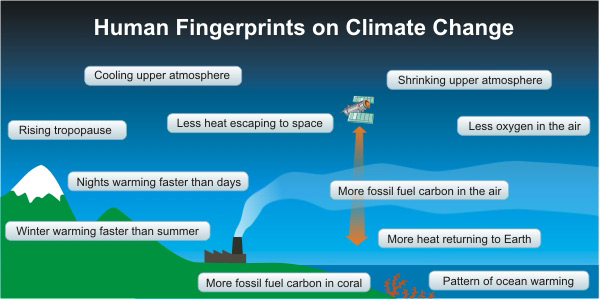The question that skeptics don't want to ask about 'Climategate'
Posted on 18 November 2010 by John Cook
A year ago, the climate debate was rocked by 'Climategate'. Email servers at the University of East Anglia were hacked, emails were stolen and distributed on the Internet. Out-of-context quotes were cited as evidence that the entire scientific case for global warming was all just a conspiracy. Even now, 12 months later, 'Climategate' is the most popular skeptic argument. But there is one question that skeptics seem to avoid:
Has 'Climategate' changed our scientific understanding of global warming?
Has the science changed? Is there any change to the many independent lines of evidence for human-caused global warming? This question is never asked because of the answer:
The evidence for human caused global warming is as solid as ever.
There are many lines of evidence that humans are causing global warming. Independent measurements of different aspects of the climate using a range of techniques by scientists all over the world all point to the same answer. When we consider the full body of evidence, we see a distinct, discernable human fingerprint on climate change.

The 'Climategate' controversy is an attempt to divert attention away from the science. This is a common tactic in movements that seek to deny a scientific consensus - assume a conspiracy theory. But there is no evidence of any conspiracy. A number of independent enquiries have investigated the conduct of the scientists involved in the emails. All have cleared the scientists of any wrong doing:
- In February 2010, the Pennsylvania State University released an Inquiry Report that investigated any 'Climategate' emails involving Dr Michael Mann, a Professor of Penn State's Department of Meteorology. They found that "there exists no credible evidence that Dr. Mann had or has ever engaged in, or participated in, directly or indirectly, any actions with an intent to suppress or to falsify data". On "Mike's Nature trick", they concluded "The so-called “trick”1 was nothing more than a statistical method used to bring two or more different kinds of data sets together in a legitimate fashion by a technique that has been reviewed by a broad array of peers in the field."
- In March 2010, the UK government's House of Commons Science and Technology Committee published a report finding that the criticisms of the Climate Research Unit (CRU) were misplaced and that CRU’s "Professor Jones’s actions were in line with common practice in the climate science community".
- In April 2010, the University of East Anglia set up an international Scientific Assessment Panel, in consultation with the Royal Society and chaired by Professor Ron Oxburgh. The Report of the International Panel assessed the integrity of the research published by the CRU and found "no evidence of any deliberate scientific malpractice in any of the work of the Climatic Research Unit".
- In June 2010, the Pennsylvania State University published their Final Investigation Report, determining "there is no substance to the allegation against Dr. Michael E. Mann".
- In July 2010, the University of East Anglia published the Independent Climate Change Email Review report. They examined the emails to assess whether manipulation or suppression of data occurred and concluded that "The scientists’ rigor and honesty are not in doubt".
- In July 2010, the US Environmental Protection Agency investigated the emails and "found this was simply a candid discussion of scientists working through issues that arise in compiling and presenting large complex data sets."
- In September 2010, the UK Government responded to the House of Commons Science and Technology Committee report, chaired by Sir Muir Russell. On the issue of releasing data, they found "In the instance of the CRU, the scientists were not legally allowed to give out the data". On the issue of attempting to corrupt the peer-review process, they found "The evidence that we have seen does not suggest that Professor Jones was trying to subvert the peer review process. Academics should not be criticised for making informal comments on academic papers".
Just as there are many independent lines of evidence that humans are causing global warming, similarly a number of independent investigations have found no evidence of falsification or conspiracy by climate scientists. However, there is an important lesson to be learnt from 'Climategate'
The real scandal of 'Climategate'
A year since 'Climategate', we can look back retrospectively and understand what happened. Anonymous hackers illegally stole emails from climate scientists in a deliberate campaign to sow doubt about climate science and discredit climate scientists. Quotes were taken out of context in an effort to mislead the public about what's happening to our climate. In the last 12 months, the scientific evidence of the negative impacts of global warming has only got stronger. The real scandal of 'Climategate' is the illegal smear campaign designed to distract people from the scientific reality of global warming.































 Arguments
Arguments
























 0
0  0
0






Comments